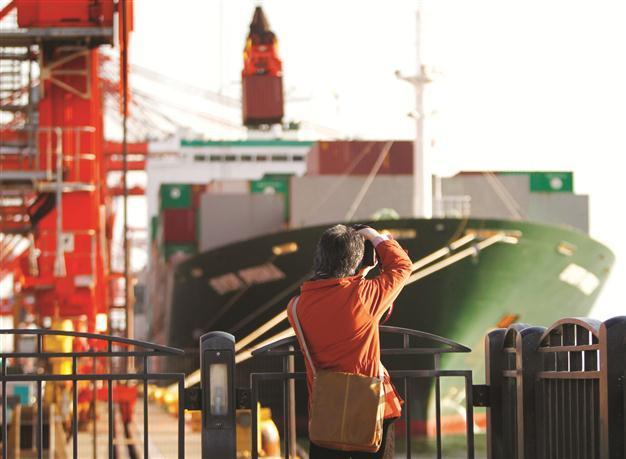Japan announces first trade deficit since 1980
TOKYO - Reuters

A man takes photographs of a container ship at a port in Tokyo yesterday. Japan’s annual trade gap calls into question how much longer the country can rely on exports to help finance a huge public debt. REUTERS photo
Japan’s first annual trade deficit in more than 30 years calls into question how much longer the country can rely on exports to help finance a huge public debt without having to turn to fickle foreign investors.The country logged a trade deficit of 2.49 trillion yen ($32 billion) for 2011, Ministry of Finance data showed yesterday, the first annual deficit since 1980, after the economy was hit by the shock of rising oil prices.
The aftermath of the March earthquake raised fuel import costs, while slowing global growth and the yen’s strength hit exports, data released yesterday showed, swinging the 2011 trade balance into deficit.
Few analysts expect Japan to immediately run a deficit in the current account, which includes trade and returns on the country’s huge portfolio of foreign investments. A steady inflow of profits and capital gains from abroad still outweighs the trade deficit.
Trade figures underscore Japan’s declining edge
The trade figures underscore Japan’s declining global competitive edge and a rapidly ageing population, compounding the immediate problem of increased reliance on fuel imports due to the loss of nuclear power.
“It means Japan becomes dependent on global savings to fund its deficit and either the currency weakens or interest rates rise,” said Jesper Koll, head of equities research at JPMorgan in Japan.
That prospect could give added impetus to Prime Minister Yoshihiko Noda’s push to double Japan’s 5 percent sales tax in two stages by October 2015 to fund the bulging social security costs of a fast-ageing society.
The largest opposition party, although agreeing with the need for a higher levy, is threatening to block legislation in parliament’s upper house in hopes of forcing a general election.
Were Japan to run a current account deficit, it would spell trouble because it would mean the country cannot finance its huge public debt -- already twice the size of its $5 trillion economy -- without overseas funds.
Japanese investors currently hold about 95 percent of Japan’s government bonds, which lends some stability to an otherwise unsustainable debt burden.
Domestic buyers are less likely to dump debt at the first whiff of economic trouble, unlike foreign investors, as Europe’s debt crisis has shown.
The trade data helped send the yen to a one-month low against the dollar and the euro yesterday.
Exports shrank, imports up
Total exports shrank 2.7 percent last year, while imports surged 12.0 percent, reflecting reduced earnings from goods and services and higher spending on crude and fuel oil. Annual imports of liquefied natural gas hit a record high.
In a sign of the continuing pain from slowing global growth, exports fell 8.0 percent in December from a year earlier, roughly matching a median market forecast for a 7.9 percent drop, due partly to weak shipments of electronics parts.
Imports rose 8.1 percent in December from a year earlier, in line with a 8.0 percent annual gain expected, bringing the trade balance to a deficit of 205.1 billion yen, against 139.7 billion yen expected.
















